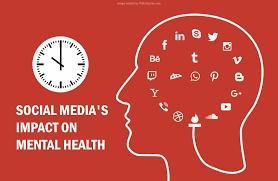How Social Media Use Affects Your Emotional Well-Being
How Social Media Use Affects Your Emotional Well-Being
The emergence of social media has transformed the way we interact with each other and the world. On one hand, it has revolutionized communication, information sharing, and entertainment access. However, there is growing concern about its adverse impact on mental health. This article examines the negative impacts of social media on mental health and provides ways to reduce them.
Social media has both positive and negative effects on mental health. It enables people to connect with others, share their experiences and feel a sense of belonging. Social media provides a platform for people with mental health issues to connect with others, share resources, and support each other.
The most significant concern regarding social media and mental health is addiction. Many people become preoccupied with their social media feeds, spending excessive amounts of time scrolling through content, which leads to disconnection from the real world and unproductivity. Social media can also result in anxiety, depression, and low self-esteem due to unrealistic comparisons and expectations. Individuals may feel the pressure to present an idealized image of themselves online, which can be stressful and exhausting.
Moreover, social media can be a breeding ground for cyberbullying and harassment, especially among young people who may lack the emotional resilience to cope with such behavior.
To mitigate the negative effects of social media, individuals must use social media in moderation. Setting limits on social media time is essential and balancing it with other aspects of life. Being mindful of how social media affects mental health and unfollowing accounts that create negativity or limiting exposure to harmful content is essential. Also, recognizing the signs of mental health issues and seeking help from mental health professionals, joining support groups, or using online resources to find information and support can be helpful.
While social media has become an essential part of our lives, research has shown that it can negatively impact mental health, especially among young people. Social media creates unrealistic expectations, comparisons, and can be addictive. Cyberbullying and harassment are also concerns. However, by using social media mindfully, individuals can reduce the risks and ensure that social media remains a positive force in their lives. Parents can play a vital role in monitoring their children's social media use and encouraging healthy behaviors.
Social media can also have a negative impact on body image and eating disorders. Social media platforms are filled with images of idealized bodies and beauty standards that can be harmful to people's self-image. Research has found that exposure to these images can contribute to negative body image, disordered eating behaviors, and eating disorders.
Another concern is the impact of social media on sleep. The blue light emitted by electronic devices can disrupt the body's natural sleep cycle, leading to poor sleep quality and quantity. This can have a range of negative consequences on mental health, including increased anxiety and depression.
Additionally, social media can contribute to the spread of misinformation and conspiracy theories, which can harm people's mental health and well-being. Exposure to false or misleading information can create anxiety, fear, and confusion, particularly during times of crisis or uncertainty.
To mitigate the negative effects of social media, individuals can take several steps. They can limit their social media use, particularly before bedtime, to improve sleep quality. They can also curate their social media feeds to ensure they are exposed to positive and supportive content, and unfollow accounts that make them feel bad about themselves.
Furthermore, people can prioritize real-world connections and meaningful relationships over social media interactions. Spending time with friends and family, engaging in hobbies and activities, and connecting with others in person can improve mental health and well-being.
To mitigate the negative effects of social media, individuals can use it in moderation, curate their feeds, prioritize real-world connections, and seek support when needed. By being mindful of the impact of social media on mental health and taking proactive steps to protect it, we can use social media as a tool for positive social connection and well-being.
Lastly, social media has revolutionized the way we communicate and interact with the world. While it has many benefits, including connecting people and providing access to information, there are concerns about its impact on mental health. Social media can contribute to addiction, anxiety, depression, cyberbullying, body image issues, and other mental health problems.
Be the first to post a message!
